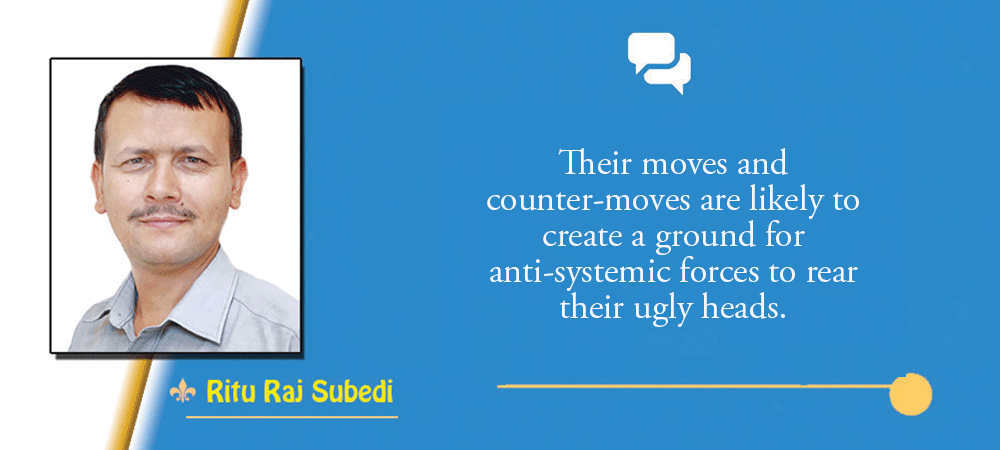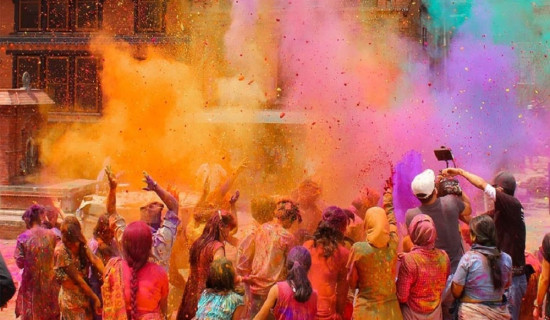- Tuesday, 3 March 2026
Presidential Election Intensifies Political Manoeuvres
The political parties are now trapped in a tug of war over the pick of a new president. The ruling alliance consisting of seven political parties of divergent ideological backgrounds is divided on the election of president slated for March 9. This has threatened the continuity of the current coalition for the CPN-Maoist Centre that heads the government is pitching for a consensus candidate for the post but its largest constituent, CPN-UML, has outright dismissed the idea of Prime Minister Pushpa Kamal Dahal Prachanda’s party, citing that it violates a power-sharing deal to give president to the former.
The UML-Maoist Centre bond seems to be on the skids. Main opposition Nepali Congress (NC) is playing gooseberry to upset the romance of two big communist parties. The NC is coaxing PM Prachanda into electing the former’s candidate to the presidential post. As per the latest media reports, the NC has promised Prachanda premiership for full five-year term if the Maoists back its presidential candidate. The NC is applying all sorts of tricks to break the present ruling alliance and kick the UML out of power. The UML chair KP Sharma Oli had played similar gambit on December 25 when he engineered the break-up of the NC-led five-party alliance, depriving the NC of government leadership.
Consensus candidate
There is a reason why Prachanda is calling for consensus candidate for the post of president. As a proverb goes, ‘a scalded dog dreads cold water,’ Prachanda had a bad experience with the sitting presidents while leading the government or remaining an influential ruling party leader in the past. In 2009, he had to quit the premiership after former president Dr. Ram Baran Yadav aborted his decision to sack the then chief of Nepal Army. The then CPN-Maoist that joined the peace process had won a landslide in the election to the first Constituent Assembly in 2008. His tussle with the then president impelled him to resign after nine months into office. This was a clear instance that a ceremonial president could flex political muscle if s/he gets a chance to manoeuvre though the constitution does not grant any special right to the president.
The role of outgoing president Bidya Devi Bhandari also came into question when she endorsed the dissolution of House of Representatives (HoR) twice in 2020 and 2021. As the protector of constitution, she was supposed to put a curb on the move of former prime minister Oli to disband the parliament. But her prompt approval of House dissolution, which the Supreme Court termed unconstitutional, drew flak from different quarters. These two incidents have made many to believe that a president from non-political background can play a more impartial role in favour of constitution, democracy and republican set-up
PM Prachanda got startled after Oli defended his decision to dissolve the HoR in his address to the first meeting of the present parliament. This was against an understanding that Oli would not touch the dissolution issue in the House. Oli's overtures have ruffled feathers of not only Maoist Centre but also NC and other political parties. There is a kind of trepidation that the parties will lose a balance in the constitutional posts if the UML gets the President, Speaker and Prime Minister. The NC that voted for Prachanda during the vote of confidence is now pressing him to repay it in the presidential election.
The political course took another twist with NC throwing support behind the Maoist Centre, much to the chagrin of UML. The latter sees it as a bait to separate Prachanda from the UML-led alliance. The UML thinks that Prachanda is sailing on two boats and has warned that December 25 deal will collapse if he backtracks from it. Earlier, Prachanda had moved to forge an alliance with Oli after NC president Sher Bahadur Deuba reneged on his promise to let the Maoist chair lead the government first. The UML claims that it 'rescued' Prachanda at a crucial moment when the NC had betrayed him.
As Prachanda sticks to support a consensus candidate, not the UML nominee, for the post of president, the future of current coalition is now under threat. He is asking the UML to field such a person for the post of president who is acceptable for all but the UML had turned down his proposal while reminding him of the previous accord. This sort of political brinkmanship involving the major parties poses a question to their integrity. Their moves and counter-moves are likely to create a ground for anti-systemic forces to rear their ugly heads.
Unseen power
The political players have seen an unseen power in the presidential post that is ceremonial as per the new constitution promulgated in 2015. The country has already witnessed two presidents playing their role as head of state after the abolition of kingship in 2008. But they failed to perform their duty without controversy. The constitution regards the president as its custodian but their partisan behaviour triggered constitutional crisis, resulting in downfall of a government in the past.
The president is considered a source of political, social and cultural cohesion in a pluralistic Nepali society that is an assortment of over hundred ethnic, linguistic and cultural groups. It is a highly esteemed post capable of transcending contested ideologies and parochial interests so that the republican set-up does not hit a roadblock. A person with high integrity and fairness should hold the revered position for such a figure can facilitate to resolve the political conflict and serve as a rallying point at the moment of national crisis.
(The author is Deputy Executive Editor of this daily.)
















